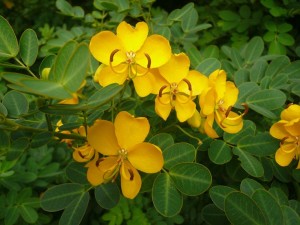Contents
Uses
- Senna is an herb. The leaves and the fruit of the plant are used to make medicine.
- Senna is an FDA-approved nonprescription laxative. It is used to treat constipation and also to clear the bowel before diagnostic tests such as colonoscopy.
- Senna is also used for irritable bowel syndrome (IBS), hemorrhoids, and weight loss.
- Senna fruit seems to be gentler than senna leaf. This has led the American Herbal Products Association (AHPA) to warn against long-term use of senna leaf, but not senna fruit. The AHPA recommends that senna leaf products be labeled, “Do not use this product if you have abdominal pain or diarrhea. Consult a healthcare provider prior to use if you are pregnant or nursing. Discontinue use in the event of diarrhea or watery stools. Do not exceed recommended dose. Not for long-term use.”
Benefits
- Treating Constipation – Senna Leaf will encourage bowel movements. The leaf causes the walls of the large intestine to contract, which will push stools through your system.
- Anti-inflammatory Agent – Senna leaf is a natural anti-inflammatory substance.
- Anti-parasitical Agent – In 2010, “Pharmacognosy Research” published an article that found senna leaf extract stopped parasite mobility during a cell-line study. The extract was also used to treat parasite infections in rats, and scientists found that parasite levels were significantly lower after a six-day period when the rats were given the extract daily. As well, rats treated with the extract showed signs of improvement in terms of anemia — low blood iron levels — and organ damage, both symptoms of the parasite infection. While the results are very promising, more study is needed to determine senna leaf’s anti-parasitical effect on humans.
Cautions
- While senna is considered generally safe, some precautions are necessary if you’re considering this powerful herb. If you suffer from a colon disorder or heart disease, consult with a doctor before taking senna. Senna leaf can also cause side effects such as nausea, vomiting or an upset stomach and can have an adverse effect on certain medications, including diuretics, blood thinners and digoxin. If you are taking any of these medications, speak with your doctor before taking senna leaf in any form.
Interactions
Moderate Interaction Be cautious with this combination
- Birth control pills (Contraceptive drugs) Ethinyl estradiol is a form of estrogen that’s in some birth control pills. Senna can decrease how much estradiol the body absorbs. Taking senna along with certain birth control pills might decrease their effectiveness.
- Digoxin (Lanoxin)Senna is a type of laxative called a stimulant laxative. Stimulant laxatives can decrease potassium levels in the body. Low potassium levels can increase the risk of side effects of digoxin (Lanoxin).
- EstrogensSome pills used for hormone replacement therapy contain the chemical estrone. Senna can reduce the amount of estrone in the body. Other pills used for hormone replacement therapy contain the chemical ethinyl estradiol. Senna can decrease how much estradiol the body absorbs. Taking senna might decrease the effects of hormone replacement therapy. Some estrogen pills include conjugated equine estrogens (Premarin), ethinyl estradiol, estradiol, and others.
- Warfarin (Coumadin)Senna can work as a laxative. In some people, senna can cause diarrhea. Diarrhea can increase the effects of warfarin and increase the risk of bleeding. If you take warfarin, do not take excessive amounts of senna.
- Water pills (Diuretic drugs)Senna is a laxative. Some laxatives can decrease potassium in the body. “Water pills” can also decrease potassium in the body. Taking senna along with “water pills” might decrease potassium in the body too much. Some “water pills” that can decrease potassium include chlorothiazide (Diuril), chlorthalidone (Thalitone), furosemide (Lasix), hydrochlorothiazide (HCTZ, Hydrodiuril, Microzide), and others.
Other Names
Alexandrian Senna, Alexandrinische Senna, Casse, Cassia acutifolia, Cassia angustifolia, Cassia lanceolata, Cassia senna, Fan Xie Ye, Indian Senna, Khartoum Senna, Sen, Sena Alejandrina, Séné, Séné d’Alexandrie, Séné d’Egypte, Séne d’Inde, Séné de Tinnevelly, Senna alexandrina, Sennae Folium, Sennae Fructus, Sennosides, Tinnevelly Senna, True Senna
References
Source: MedlinePlus, http://www.nlm.nih.gov/medlineplus/druginfo/natural/652.html
Source: LiveStrong, http://www.livestrong.com/article/174419-senna-leaf-health-benefits/

